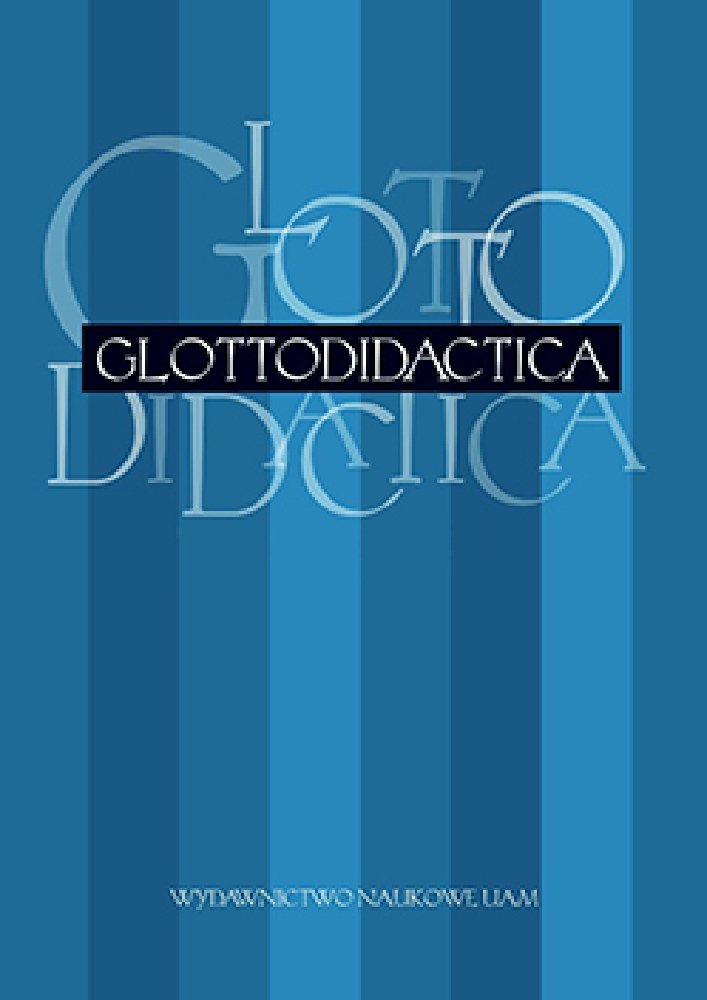Abstract
The aim of this study was to explore: 1) whether the student-teachers (as researchers) enter into a dialogue with their learners (the researched) in the course of their research; 2) what is the nature of this dialogue; 3) what role this dialogue plays in the teachers’ and the learners’ lives. In this study I draw on teachers’ narratives which were stimulated by questions which emerged after having read the research chapters of MA theses written in the field of EFL learning and teaching.References
Baniak, J., 2005. Różnorodność spojrzeń na dialog i na jego znaczenie dla ludzi. In: Baniak, J. (ed.), Filozofia dialogu. Vol. 3. Perspektywa i aspekty dialogu, 7–11.
Buber, M., 1937/1958. I and Thou. New York: Charles Scribner’s Sons.
Czeżowski, T., 1969. O dyskusji i dyskutowaniu. In: Czeżowski, T. (ed.). Odczyty filozoficzne. Toruń: TNT, 191–197.
Fine, M., 1994. Working the hyphens. In: Denzin, N.K., Lincoln, Y. (eds.). Handbook of Qualitative Research. Thousand Oaks: Sage Publications, 70–82.
Gadamer, H.G., 1980. Niezdolność do rozmowy. Znak 309 (3), 369–376.
Kłoczowski, J.A., 2005. Filozofia dialogu. Poznań: W drodze.
Kopaliński, W., 1983. Słownik wyrazów obcych i zwrotów obcojęzycznych. Warszawa: Wiedza Powszechna.
Kubinowski, D., 2010. Jakościowe badania pedagogiczne. Filozofia – Metodyka – Ewaluacja. Lublin: UMCS.
Ostrowska, U., 2000. Dialog w pedagogicznym badaniu jakościowym. Kraków: Oficyna Wydawnicza Impuls.
Piechowiak, M., 2005. Ontyczne fundamenty dialogu. In: Baniak, J. (ed.). Filozofia dialogu. Vol. 3. Perspektywa i aspekty dialogu, 13–24.
Sawicki, M., 1996. Hermeneutyka pedagogiczna. Warszawa: Wydawnictwo Naukowe Semper.
Stachewicz, K., 2003. Fenomenologia a dialog. In: Baniak, J. (ed.). Filozofia dialogu. Vol. 1. Drogi i formy dialogu, 47–59.
Szulakiewicz, M., 2004. Z historii myślenia dialogicznego. In: Baniak, J. (ed.). Filozofia dialogu. Vol. 2. Między akceptacją i odrzuceniem: rola dialogu w życiu ludzi, 213–236.
Urbaniak-Zając, D., Piekarski, J., 2003. Badania jakościowe – orientacje teoretyczno-metodologiczne. In: Urbaniak-Zając, D., Piekarski, J. (eds.). Jakościowe orientacje w badaniach pedagogicznych. Studia i materiały. Łódź: Wydawnictwo Uniwersytetu Łódzkiego, 13–31.
Wiśniewska, D., 2009. Dialog jako przestrzeń między badaniem, poznaniem a rozwojem nauczyciela. In: Nijakowska, J. (ed.), Język. Poznanie. Zachowanie. Perspektywy i wyzwania w studiach nad przyswajaniem języka obcego. Łódź: Wydawnictwo Uniwersytetu Łódzkiego, 283–298.
License
Authors
Authors of texts accepted for publication in Glottodidactica are required to complete, sign and return to the Editorial team’s office the Agreement for granting a royalty-free license to works with a commitment to grant a CC sub-license.
Under the agreement, the authors of the texts published in Glottodidactica grant Adam Mickiewicz University in Poznań a non-exclusive, royalty-free license and authorize the use of Attribution-NoDerivatives 4.0 International (CC BY-ND 4.0) Creative Commons sub-license.
The authors retain the right to the free disposal of the work.
Users
Interested Internet users are entitled to use works that have been published in Glottodidactica since 2016, under the following conditions:
▪ attribution – obligation to provide, together with the distributed work, information about the authorship, title, source (link to the original work, DOI) and the license itself.
▪ no derivatives – the work must be preserved in its original form. Without the author's consent, it is not possible to distribute the modified work in the form of translations, publications, etc.
Copyrights are reserved for all texts published before 2016.
Miscellaneous
Adam Mickiewicz University in Poznań retains the property right as a whole (layout, graphic form, title, cover design, logo etc.).
Privacy statement
The names and email addresses published on this journal site will be used exclusively for the purposes declared by this journal and cannot be used for any other purpose or by any other party.




